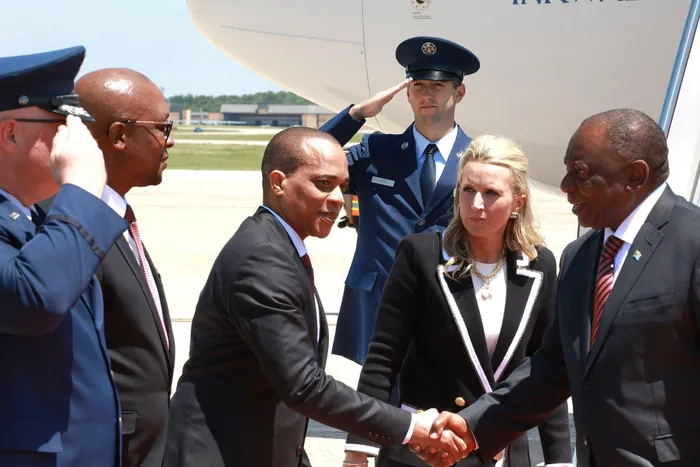
President Cyril Ramaphosa arrives at the Joint Base Andrews Airport in Washington. He is received by Trade and Industry and Competition Minister Parks Tau, South African Embassy Chargè d 'Affairs, Stanley Makgohlo, Col Pumla Dlali, Assistant Defence Attache at the South African Embassy and Abby Jones, Acting Chief of Protocol, State Department.
Image: Presidency
AS A chartered plane carrying 49 Afrikaner “refugees” touched down in Washington, D.C., under the invitation of former President Donald Trump, South Africa’s President Cyril Ramaphosa made a far more consequential landing of his own.
He arrived in the United States this week to lobby for the renewal of the African Growth and Opportunity Act (AGOA), a preferential trade agreement that grants South African exporters duty-free access to American markets.
That this diplomatic visit follows so closely on the heels of a flight cloaked in white grievance and manufactured genocide narratives is no coincidence, it is a symptom of the same unresolved contradictions at the heart of South Africa’s post-apartheid identity: a nation that cannot decide whose suffering it takes seriously.
Trump’s invitation to self-styled Afrikaner victims, most of whom claim “discrimination” and “white genocide,” is a damning reflection of how global far-right movements have opportunistically latched onto South Africa’s unresolved racial wounds.
While these individuals find safe haven in the United States, the Women on Farms Project reminds us that the actual marginalised black and brown farm workers, largely women continue to suffer silently, unheard by the same government now pleading with the U.S. to keep its markets open.
“They are opportunists,” said the Project’s Denile Samuel, speaking plainly about the white Afrikaners who fled under Trump’s programme. “The real people who are marginalised, the real people who are not heard and not seen are farm workers.”
Her words land with quiet force. They highlight a bitter irony: that even as white South Africans reinvent themselves as persecuted minorities abroad, the working class remains ignored by ministers who can’t be bothered to acknowledge invitations, let alone engage with communities facing daily violations of their labour rights.
It is against this backdrop of performative victimhood and governmental neglect that Ramaphosa’s U.S. visit must be understood. The official reason is trade or more accurately, the attempt to save it.
AGOA is set to expire later this year, but its renewal is far from guaranteed. American patience with South Africa has worn thin. Pretoria’s geopolitical non-alignment particularly its warm ties with Russia and China has unsettled Washington.
The Lady R scandal, in which a sanctioned Russian cargo ship docked in Simon’s Town under suspicious conditions, continues to cast a long shadow. Although President Ramaphosa’s Phala Phala cover-up has largely consumed domestic attention, it is the shadow diplomacy of the failure to assure the U.S. of South Africa’s reliability that now threatens billions in export revenue and thousands of local jobs.
To be clear, this is not just about citrus fruit and car parts. AGOA is a litmus test for South Africa’s global legitimacy. If it fails to secure renewal, it will be a signal that Washington no longer views Pretoria as a trusted partner, but rather as a country adrift neither reliable ally nor coherent adversary. The optics matter. The President is not going to Washington in triumph. He is going cap in hand, attempting to make nice with a partner that no longer trusts us.
And he is doing so while right-wing white South Africans land in the same city, not as emissaries, but as “refugees” claiming victimhood under the very state he represents. The symbolic whiplash is staggering.
The backdrop to Ramaphosa’s trip also includes a more surreal diplomatic episode: the tense Oval Office confrontation between Donald Trump and Ukrainian President Volodymyr Zelensky just weeks ago.
That meeting was marked by Trump’s theatrical accusation that Zelensky was “gambling with World War Three” and the Ukrainian president’s desperate attempt to placate an increasingly hostile American administration. The parallel is unnerving. The White House has become a theatre where global leaders must perform for American approval whether they are trying to save their sovereignty, their trade deals, or their economic lifelines.
Ramaphosa’s delegation knows that time is running out. If they cannot secure AGOA’s renewal, they will at least try to delay its death. Their objective is simple: get their ducks in a row before the doors shut completely. The urgency of the visit reveals what government will not say out loud that South Africa no longer commands automatic goodwill, and that trade access is now something we must actively fight to keep.
It is a humiliating position for a country that once sold itself as the moral compass of the Global South. But perhaps it is also a necessary reckoning. South Africa cannot continue to straddle every fence siding with Russia in UN votes while calling itself a neutral broker, cosying up to China while relying on U.S. trade. That diplomatic ambivalence has now reached its limit. The AGOA negotiations will test whether we can still walk that tightrope or whether the world, much like our own neglected workers, has simply stopped listening.
Roos is a policy writer, researcher and political analyst
Related Topics: